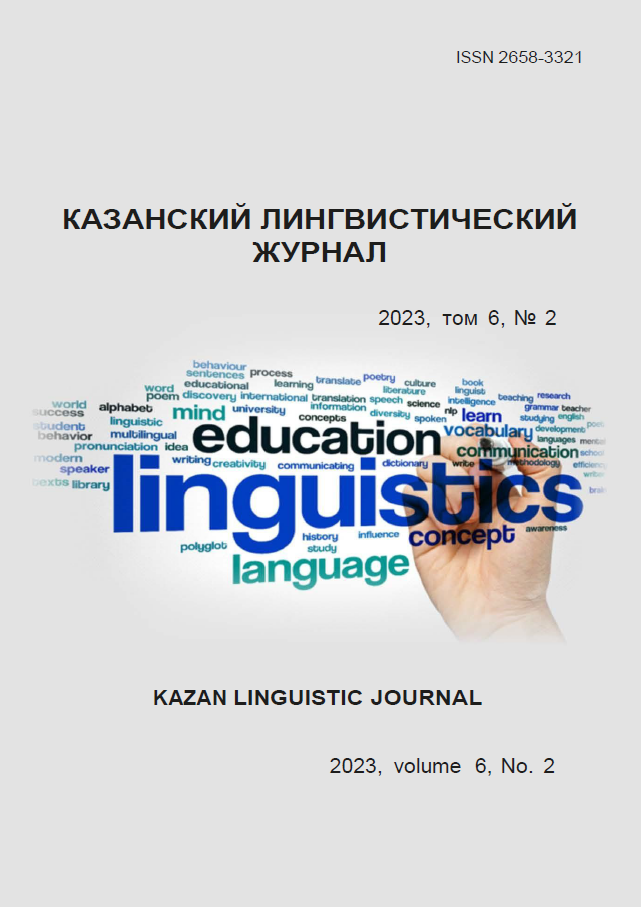Communicative Interaction on Expressive Speech Acts
https://doi.org/10.26907/2658-3321.2023.6.2.236-245
Keywords:
apology, expressive, intentionality, pattern, speech act, speech etiquetteAbstract
The wide spread of speech acts theory observed in linguistics of the second half of the XX century allowed to reveal the communicative and pragmatic essence of communicative phenomena. The multidimensional nature of research approaches applied to the analysis of communicants' speech acts led to a deep understanding of the nature of expressive speech acts. The present study systematizes the main milestones of expressions interpretation, their social characteristics, intentionality on the example of the speech act of apology. The purpose of this work is to establish the nature of the interaction of the communicative intentions of the speaker and the listener in the speech act of apology, to clarify the communicative strategies and techniques used to achieve a favorable outcome, to analyze ways of getting optimal combined linguocreative approach with etiquette speech pattern techniques. The material of the study was the theoretical provisions and principles put forward in the works of J. Serl, J. Austin, Y. Habermas, T. Ballmer and V. Brennenstul, G.G. Pocheptsov, Y.D. Apresyan, V.V. Bogdanov, M.Ya. Glovinskaya, A.G. Pospelova, N.I. Formanovskaya et al. In the process of analyzing scientific concepts, methods of description, generalization, formalization, analysis, synthesis were used. The paper emphasizes that expressives, unlike other speech acts, are associated with the expression of the emotional and expressive state of the speaker. It is revealed that the speech act of apology has polyintensionality, is etiquette-oriented, is focused on compliance with social norms and rituals, assumes subordination to the social institution of the listener. The realization of the speech act of apology implies politeness, respect for the partner, consideration of his interests. Among the factors determining the nature of interaction in the speech act of apology, consideration of the social affiliation of the communicants, the discursive context, and the sincerity of the speaker's intentions are mentioned.
References
References
Pochepcov G.G. Language and humor. Kiev: Vishha shkola; 1981. (In Russ.)
Glovinskaja M.Ja. Semantic types of specific oppositions of the Russian verb. Moscow: Nauka; 1982. (In Russ.)
Formanovskaja N.I. The use of Russian speech etiquette. Moscow: RusskiyJazyk; 1984. (In Russ.)
Ostin Dzh. A word as an action. Moscow: New in foreign linguistics. 1986;(17):22–31. (In Russ.)
Serl' Dzh.R. Classification of illocutionary acts. New in foreign linguistics. 1986;(17). Available from: https://classes.ru/grammar/159.new-in-linguistics-17/source/worddocuments/_4.htm [accessed 19.02.2023]. (In Russ.)
Serl' Dzh.R. Indirect speech acts. New in foreign linguistics. 1986;(17). Available from: https://classes.ru/grammar/159.new-in-linguistics-17/source/worddocuments/_5.htm [accessed 19.02.2023]. (In Russ.)
Serl' Dzh.R. What is a speech act? New in foreign linguistics. 1986;(17). Available from: https://classes.ru/grammar/159.new-in-linguistics-17/source/worddocuments/i2.htm [accessed 19.02.2023]. (In Russ.)
Bogdanov V.V. Speech communication. Pragmatic and semantic aspects. Leningrad: LSU; 1990. (In Russ.)
Pospelova A.G. Functional aspect of speech acts study: illocutionary and interactive features. Three-aspect grammar based on the material of the English. Saint Petersburg: SpbGU; 1992. P. 68–85. (In Russ.)
ApresjanJu.D. Lexical semantics. Moscow: Vostochnajaliteraturа; 1995. (In Russ.)
Formanovskaja N.I. To clarify the concept of expressive speech acts. Russian lan-guage abroad. 1998;(4):40–45. (In Russ.)
Ballmer T.T., Brennenstuhl W. Speech Act Classification: A Study in the Lexical Analysis of English Speech Activity Verbs. Available from https://archive.org/details/speechactclassif0000ball [accessed 19.02.2023].
Habermas J. The theory of communicative action. Available from: https://archive.org/details/theoryofcommunic01habe [accessed 19.02.2023].
Goffman E. Relations in public. New York: Basic Books; 1971.
Ratmajr R. Pragmatics of apologies: a comparative study based on the material of the Russian language and Russian culture. Moscow: Jazyki slavjanskoj kul'tury; 2003. (In Russ.)
Grajs P. Logic of speech communication. Moscow: New in foreign linguistics. 1985;(16):213–217. (In Russ.)
Brown P., Levinson S.C. Politeness: some universals in language usage. Cambridge: Cambridge University Press; 1987.
Kubrjakova E.S. Nominative aspect of speech activity. Moscow: URSS, LKI; 2008. (In Russ.)
Trofimova N.A. Expressive speech acts in dialogic discourse. Semantic, pragmatic, grammatical analysis. Saint Petersburg: VVM; 2008. (In Russ.)






